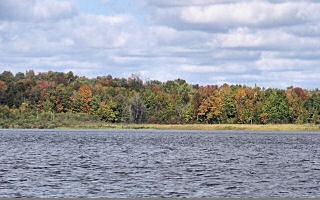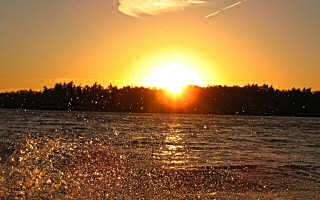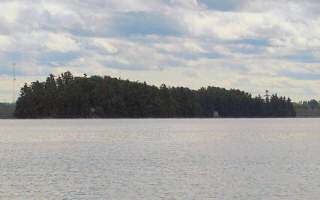There are several Otter Lakes in Ontario. Our Otter Lake is a small lake, situated in Leeds/Grenville County, and within the Township of Rideau Lakes in the heart of the Rideau Lakes Area. The lake lies close to Highway 15 between the villages of Lombardy and Portland, and is east of Big Rideau Lake, however Otter Lake is not part of the Rideau Canal System.
Otter Lake is located on a limestone plain which abuts the Frontenac Axis of the Canadian Shield. As a result there are features around the lake which show the hard igneous rocks typical of the shield and also the soft light brown limestone typical of the area. Plant and animal life are quite sensitive to changes in acid levels and limestone tends to buffer the effects of acid rain which drifts in from the industrial areas of the US and Canada to the southwest.
Otter Lake is about about 5.3 km long and covers1700 acres. It is centered in an elongated drainage basin of about 10,000 acres. The shoreline length is about 20 km. The lake is 124 meters above mean sea level and is part of the Rideau River drainage basin. There are several parent streams flowing into Otter Lake and one primary outlet, which is Otter Creek, which meanders about about 33 km before flowing into the Rideau River South of Smith’s falls.

Otter lake is also fed by numerous springs although little is known about the volume or source of these springs. Overall, the water in Otter Lake replenishes about every two years by surface runoff, precipitation and springs. Water exits the lake through Otter Creek and by surface evaporation, mostly during the summer months.
There are also numerous natural wetland areas around the lake that are a habitat for a variety of aquatic life. The common loon is a frequent summer visiter arriving in early May and often staying until late November. The lake is home to about six loon pairs that nest in many of these wetlands. Their nests can often be found if you know where to look and occasionally a loon can be seen sitting on it. Hatching usually occurs towards the end of June or early July. While the young loons are natural swimmers they cannot dive so they have to be fed by their parents. In addition to loons mergansers can sometimes be found sitting on docks. Canada geese often stop off at Otter Lake to raise their large families. While the goslings are really cute when they first take to the water, the geese family has to stick around until the young are able to fly and they love to eat juicy fresh grass close to the shore. As a result they also leave lots of stuff behind on that same shore! The lake is also home to many great blue herons who mostly spend their time in and around wetlands. While generally a rather timid bird one may occassionally stay long enough on a dock to be photographed. There is an abundance of wildlife on land too. Deer are frequently sighted on cottage access roads and even in property owners yards. The occasional black bear has also been sighted though not as yet photographed. Raccoons are frequent visitors all year round.

Because Otter Lake lies more or less in a north/south direction, there are often some spectacular sunrises and sunsets that can be viewed from property owners docks, balconies and decks. No sunrise or sunset is ever the same and some of them are captured in the image sequences on the left. We also get some spectacular sound and light shows along with our late evening summer thunderstorms.

Otter Lake has several islands. Most of the larger islands are privately owned with cottages, however the smaller ones, many of which are are mere granite outcroppings make for excellent picnic or camping spots often with excellent swimming.
Despite it’s relative small size Otter Lake holds a large volume of water and is quite deep, up to 100 ft at it’s deepest location. This means that the lake is one of the last lakes in the Rideau Lakes region to freeze in winter. As a result, in late November and often most of December the lake is home to a large variety of water fowl. Loons, Goldeneyes, Mergansers and even the occasional Trumpeter Swan will use the lake as a stopover point during their migration South for the winter


